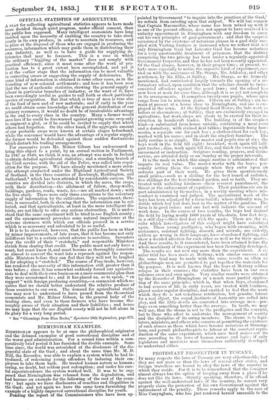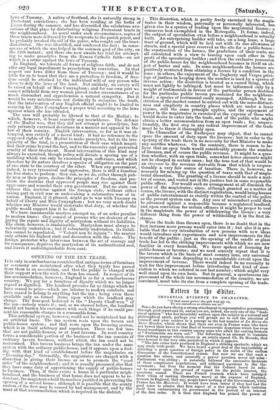PROTESTANT PROSELYTISM IN TUSCANY.
IN many respects the laws of Tuscany are very objectionable, but they are not more so than the laws of several other states, and foreign travellers are bound to obey the laws of the country in which they reside. For it is to be remembered that the foreigner almost always has the option of keeping away from a place if he does not like its laws. Strictly speaking, therefore, if he offend against the well-understood laws of the country, he cannot very properly claim the protection of his own Government against the enforcement of the penalty. These remarks apply to the ease of Miss Cunyngham, who has just rendered herself amenable to the
laws of Tuscany. A native of Scotland, she is naturally strong in Protestant convictions ; she has been residing at the baths of Lucca during the summer, and has diversified the salubrious avo- cations of that place by distributing religious Protestant tracts in the neighbourhood. As usual under such circumstances, copies of these tracts were delivered by the recipients to the parish priest, and he probably invoked the aid of the police, who sought out the tract- distributor. She was identified, and confessed the fact ; in conse- quence of which she was lodged in the common gaol of the city, on the 12th instant ; and there she now awaits her trial for attempt- ing to make proselytes from the Roman Catholic faith—an act which is a crime against the laws of Tuscany. In England, we tolerate all forms of religious faith, and do not offer any legal impediment to proselytism by conviction. In that respect our laws differ from those of Tuscany ; and it would be little for us to boast that they are a protection to freedom, if free- dom could be attained by the individual will of any person who chose to defy the laws of the land. Not unlikely, an outcry will be raised on behalf of Miss Cunyngham ; and for our own part we cannot withhold from any woman placed under circumstances of so much discomfort and apprehension a natural sympathy. But it would be very mischievous not distinctly to recognize the truth, that the intervention of any English official ought to be limited to securing for Miss Cunyngham a proper trial according to the laws against which she has offended.
The case will probably be likened to that of the Madiai; to which, however, it bears scarcely any resemblance. The defence of the Madiai was, that they did not attempt to proselytize, but only privately exercised devotions in a manner not opposed to the law of their country. English intervention, so far as it was at- tempted, was entirely of a moral kind ; it had no reference to the supposed rights of the Madiai to make proselytes, but to the irre- gularity of the trial, to a presentation of their case which magni- fied their crime beyond the fact, and to the excessive and protracted cruelty of their treatment. Moral intervention of this kind may always be exercised, though policy will dictate a sparing use of a meddling which can only be exercised upon sufferance, and which therefore by its nature involves a species of obligation on the part of one state to the courtesy of the other. When any government, indeed, is very tyrannical and oppressive, there is still a function for free states to perform : they can, as we do, either through pub- lic men or their press, declare the principles of freedom, and pro- claim the doctrine that oppressed people may rise against their oppressors and remodel their own government. But no state can enforce this doctrine against the foreign state, without either taking part in civil war or undertaking a substantive war of in- vasion. England, if it pleased, might go to war with Tuscany on behalf of liberty and Miss Cunyngliam ; but we very much doubt whether any Minister would undertake that duty, or whether the public would support him if be did. We have innumerable martyrs amongst us, of an order peculiar to modern times : they consist of persons who are desirous of en- joying the repute and dignity of martyrdom without its liabilities. The claim, however, is inadmissible. Martyrdom must always be voluntarily undertaken ; but if voluntarily undertaken, its liabili- ties cannot be repudiated. " Volenti non fit injuria ": the martyr only attains his highest rank and decoration with the stake. The foreign protector who intervenes between the act of courage and its consequence, deprives the martyrdom of its authenticated seal, and leaves it undistinguishable from cant.



























 Previous page
Previous page